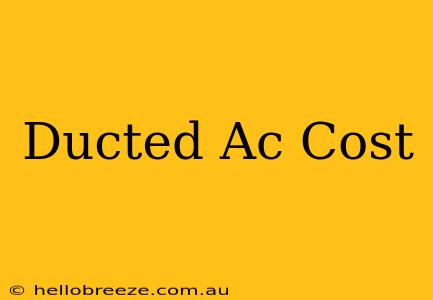Choosing a ducted air conditioning system is a significant investment for your home comfort. Understanding the ducted AC cost is crucial before making a decision. This comprehensive guide breaks down the various factors influencing the price, helping you budget effectively and choose the right system for your needs.
Factors Affecting Ducted AC Cost
Several key factors contribute to the overall cost of ducted air conditioning. Ignoring any of these could lead to unexpected expenses.
1. System Size and Capacity
The size of your home directly impacts the ducted air conditioner cost. Larger homes require larger systems with more powerful units, leading to a higher initial investment. Accurate calculation of your home's cooling needs, often performed by an HVAC professional, is crucial to avoid overspending or underpowering your system. Underpowered systems are inefficient and fail to cool adequately, while overpowered systems are wasteful and more expensive than necessary.
2. Type of System
Different types of ducted systems exist, each varying in price. For example, reverse-cycle ducted systems offer heating and cooling capabilities, typically costing more upfront but saving money in the long run. Single-stage systems are generally more affordable than two-stage or variable-speed systems, which offer greater energy efficiency and comfort control, though at a premium price.
3. Installation Complexity
The complexity of your home's structure and existing ductwork greatly affects ducted air conditioning installation cost. Homes with multiple levels, complex layouts, or existing obstacles will require more labor, extending the overall installation time and increasing the cost. Accessibility to install the outdoor unit is also a key factor.
4. Ductwork Requirements
Existing ductwork can significantly influence the price. If you need new ductwork installed, the cost can be substantial, often adding a considerable amount to the total expense. The material choice for the ductwork (e.g., flexible vs. rigid) also affects the final cost. Repairing existing ductwork may be a more affordable option than complete replacement, depending on the extent of damage.
5. Brand and Features
The brand you choose significantly impacts the price of a ducted air conditioning system. Established brands with a reputation for quality and reliability tend to be more expensive than lesser-known brands. Additionally, advanced features like smart home integration, zoning capabilities, and enhanced filtration systems increase the overall cost.
6. Location and Labor Costs
Your location plays a role in the total cost of ducted air conditioning. Labor rates vary regionally, impacting the installation expenses. Areas with higher labor costs will naturally lead to higher installation fees.
Getting the Best Value for Your Ducted AC Investment
While obtaining the lowest possible ducted air conditioning price might seem tempting, prioritizing long-term value is crucial.
1. Professional Assessment
Consult multiple HVAC professionals for accurate assessments of your home's cooling needs and personalized quotes. Compare quotes carefully, ensuring they include all aspects of the project, not just the equipment cost.
2. Energy Efficiency Ratings
Pay close attention to the SEER (Seasonal Energy Efficiency Ratio) rating. Higher SEER ratings indicate greater energy efficiency, resulting in lower running costs over the system's lifetime. Consider the cost difference between a higher-SEER system and a lower-SEER one and calculate the payback period based on expected energy savings.
3. Warranty and Maintenance
Check the warranty offered by the manufacturer and installer. A robust warranty protects your investment against defects and provides peace of mind. Consider including regular maintenance contracts in your budget for optimal system performance and longevity.
Conclusion: Making an Informed Decision
The cost of ducted air conditioning varies greatly based on several interacting factors. By understanding these factors and making informed choices, you can select a system that best suits your budget and comfort requirements without compromising quality or long-term value. Remember to get multiple quotes, carefully weigh your options, and prioritize both initial cost and long-term energy efficiency for a truly worthwhile investment.

